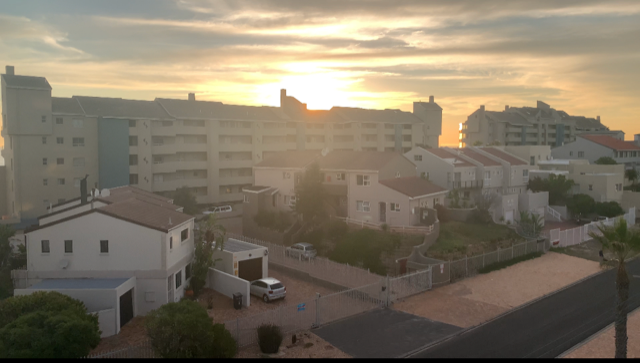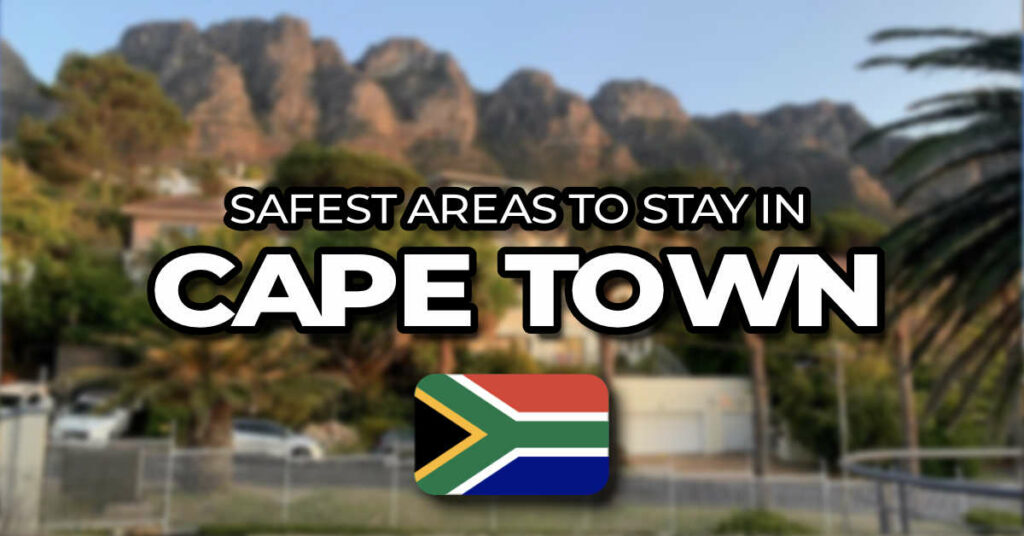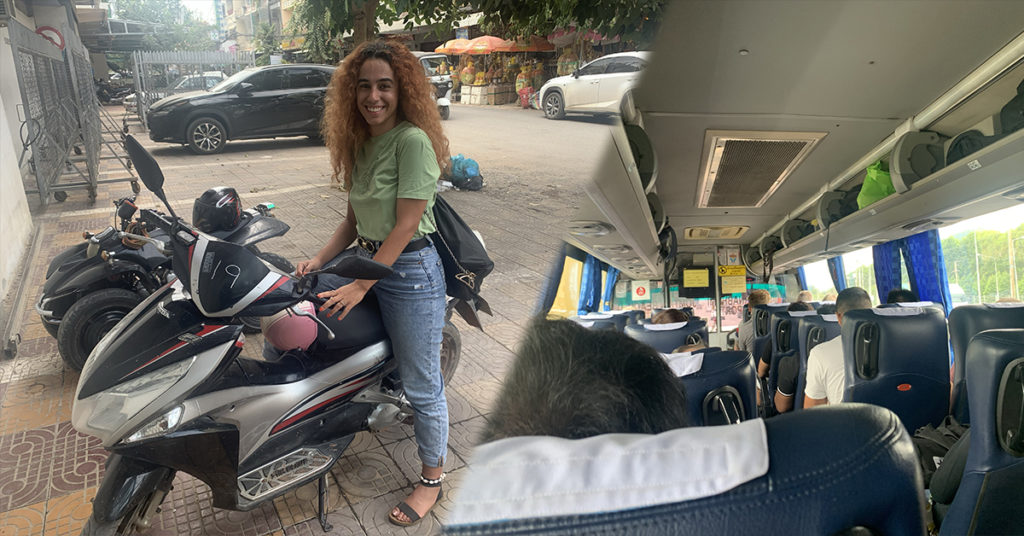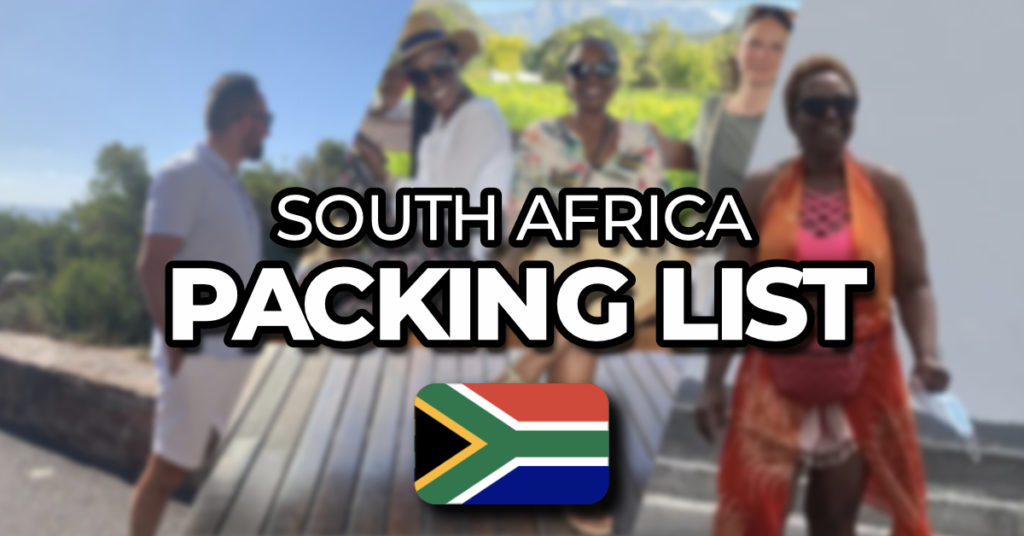Whether you are considering moving or just coming here on holiday, you may be wondering is Cape Town safe? And need some guidance on the safest areas in Cape Town to stay or live. As a local South African living in Cape Town for 12 years, I’m going to share with you my best advice on which areas to stay and which areas to avoid. In this article, I will share the facts and my own experience living on the ground here as a local. As beautiful as this city is, it has its fair share of crime, so it’s important to choose a good area, so let me help guide you.
Which Are The Safest Suburbs To Stay & Live in Cape Town?
Here is the list of the top 3 safest areas to live in Cape Town
- Camps Bay & Clifton
- Constantia
- Bishopscourt
Camps Bay & Clifton



These are two of the most expensive suburbs in Cape Town and it’s very easy to see why. Safety is one of the main things that both Camps Bay and Clifton are known for, but Camps Bay is also the Miami of South Africa, a playground for the rich and famous. In this area, homes cost anything from 10 mil ZAR ($500 k) for a three-bedroomed house that’s not sea-facing to 95mil ZAR ($5 mil) for a ten-bedroomed mansion that provides 360-degree views of the Atlantic Ocean.
You can see why safety and security are a priority for Camps Bay & Clifton residents because they have expensive properties to protect, alongside Aston Martins in the garages as well.
Camps Bay has some of the best restaurants in the city and it is right on the Atlantic Ocean with Table Mountain and the Twelve Apostles behind it so the views are truly uncontested in this part of the world.
Clifton and Camps Bay share the same seafront and views, and sometimes it’s hard to tell where one ends and where the other begins. Most of the Clifton homes are built on cliffs providing them with the most breath-taking views and stunning sunsets.
Constantia
The leafy suburb of Constantia is nestled between Hout Bay and Wynberg and it is home to many well-known wine farms such as Constantia Glen, Groot Constantia, and Silvermist. It is characterized by many stately homes, some of them with horse stables and huge tennis courts, and so Constantia homes can cost anything from 4 mil ZAR to 80 mil ZAR ($200k – $4.5 mil).
Most homes in this suburb have security cameras, security beams, and other security features including different car patrol companies guarding the area, and so you hardly hear of any crimes happening in this area.
Bishopscourt
Bishopscourt is the neighbor of Constantia and they share schools, shopping centers, and other public facilities like sports facilities. Bishopscourt is known as one of the wealthiest suburbs in Cape Town. When I lived in Hout Bay I used to go for Sunday drives just to look at the homes in Bishopscourt and Constantia, to see how “the other half lives”.
This is one of the quietest suburbs where you hardly spot anyone on the streets as you drive around the suburb. Security is very tight with gated communities and security patrols stationed at almost every corner. Since Bishopscourt is also safely tucked away between Constantia and Claremont it doesn’t provide the best escape routes for criminals which contributes to its safety profile.
Expect to pay anything from around 6 mil ZAR – 145 mil ZAR ($300k – $8 mil) for a house in this suburb.
Dangerous Areas in Cape Town To Avoid
These are the areas to avoid in Cape Town:
- Khayelitsha
- Mitchell’s Plain
- Manenberg
- Nyanga
- Hanover Park
Khayelitsha
Khayelitsha is one of the townships with the highest crime rates in Cape Town and also one of the fastest-growing areas outside of the city. It is about 30 km from the city and about half that distance from the Cape Town International Airport. Townships are those ‘suburbs’ that were built for black people and people of color back in the apartheid era by the government to separate race groups.
Unfortunately, these areas are still underserved by the present government, unemployment is rife and so is crime.
Mitchells Plain
Pretty much everything I’ve said about Khayelitsha applies to Mitchell’s Plain as well. MP was built for black residents back in the day. It has one of the highest crime rates and is a township characterized by drugs and gangsterism just like Khayelitsha, it’s highly underserved by the local government and is an area you want to avoid at all costs unless you are companied by a local friend.
Manenberg
This is another suburb that was created for low-income colored families by the apartheid government, Manenberg is one of the most feared areas in this city that you should avoid at all costs. It is ruled by gangsters and faction fights break out regularly. It is also known as the murder capital of the Western Cape province, unemployment is high and the houses are overcrowded. The suburb also has limited access to basic services like health, etc.
Finding Accommodation & Place To Call Home
For Hotels, Hostels & Guesthouses
The best areas for hotels and temporary accommodation are Greenpoint, Seapoint, the City Bowl, Gardens, Tamboerskloof, Oranjezicht, and Camps Bay/Clifton. The suburbs that are on the West Coast like Bloubergstrand are also great for holiday accommodation and may be slightly cheaper because they’re not in the city.
Having said that though Blouberg has some high-end guesthouses that are rated 4-star and above so your choice will greatly depend on your budget and the type of accommodation that you’re looking for.




Cape Town is a holiday destination and that means you are spoiled for choice when it comes to finding accommodation to suit your needs. There are high-end, mid-range, and low end options, so anyone looking to visit Cape Town on a budget is covered.
Top tip: if you are looking for budget accommodation consider hostels and guesthouses or aparthotels that have self-catering facilities. The Seapoint-Greenpoint area is a great start for budget and mid-range but both also have some high-end establishments.
I find booking.com to be one of the best search engines when it comes to looking for holiday accommodation in this country, especially because they always offer discounted prices for some reason or other. Some of those reasons may be long-term stays or booking far in advance. There are many other similar platforms including the Airbnb app of course if you’re looking for a guesthouse.
Airbnb also gives discounted rates for stays of a month or longer, but you might have to pay daily charges for electricity and water in some cases.
Here is what you should expect to pay for accommodation in these areas in Cape Town:
- Budget accommodation: Expect to pay anything from 200 ZAR ($12) a night (hostel) to 1,500 ZAR ($80) for a room
- Mid-range: You should pay between 1,600 ZAR – 2,400 ZAR per night ($90 – $130)
- High-end: Here you are looking at 2,500 ZAR + per night ($140 +)
For Permanent Stays
As a foreigner, if you’re looking to buy or rent property in South Africa you are required to have a legal permanent or temporary residence permit that has been approved by the Department of Home Affairs. Temporary residence permits include a visitor’s permit, a work or entrepreneurial permit, and a retired person permit.
Where to Look To Find Properties
Using the list of suggested areas on this post look for property on a reputable search platform such as:
Choosing a Neighbourhood to Live
Here are some of the things to check for before choosing a neighborhood:
- Are there good schools in the area?
- Are there good hospitals/health facilities
- Where is the nearest police station?
- What is the traffic like?
- Foot traffic or people loitering around
When I moved to Cape Town I had no idea what the safest areas were nor did I know the difference between the northern and the southern suburbs, but I was moving for work, so the two main things on my list of priorities were, to find an area not too far from work and with good schools for my daughters.
Your reasons may be very different from mine, for instance, you could be working from home and not have kids. In that case, then living in the city may be the best thing for you, especially if you want to be close to where the action is.
If you have kids and prefer the suburbs to the city look at the areas with the best schools, medical facilities, etc.
To note: gated communities are often the best places to live in South Africa, because of the high security. If not in a gated suburb check far the police station in case you should ever need it. Also, check the foot traffic because that often tells you if the area has a lot of vagrancy or if it provides easy access to criminals.
How To Attend House Viewings
Things to look out for when viewing the property:
- Security system of the house
- Type of street
- Maintenance of the place
- Smells
For me, once I had identified the south as the area close to my workplace I went on one of these search platforms and chose six houses/apartments that were within my budget and aesthetics, called the listing agents, and made appointments to view.
I came to Cape Town for a weekend, viewed three places on a Saturday and three on Sunday, chose the best one for me, and had signed the application by the time I left to go back home to make preparations to move.
I understand not everyone has the luxury of popping in for a weekend to view especially if you live in a different country, so my suggestion would be for you to test the waters by coming on holiday first before you make the decision to move. This will give you the feel of the city and as you explore the sights you will get a sense of all the different areas or suburbs and see where you would like to live on a more permanent basis.
One disadvantage I have noticed when it comes to viewing on the weekend is not getting the full picture of what the traffic will be like during the week! This is why I have mentioned street type on the list of things to check. I find houses that are on the main roads to be a challenge to get in and out of during peak-hour traffic.
Houses that are at the end of the street also often become crime targets because it’s easy for burglars to break in and out without being spotted by the neighbors. This is why the security features of the house are also important. While a good security system does give you peace of mind, too many burglar bars may indicate a crime hotspot, so casually check the neighbors’ place too!
This may not be necessary in an apartment block, but in this case, look for a block with good security at reception or the main gate.
When it comes to the maintenance of the house, this is very important as you don’t want to be always fixing things that are falling apart. Weird smells are also a good indicator of the maintenance or level of cleanliness of the previous owner or tenant, and yes you can get rid of some smells with thorough cleaning but other smells stay with you forever!



Crime Statistics in Cape Town
Murder, sexual offenses, and robberies are the leading crimes in the Western Province but please note that this includes the whole province, not Cape Town only, so please interpret the stats with caution. Drugs are also very high up on the list followed by theft and burglaries. Cape Town has its fair share of crime even thought it is considered one of the safest cities in South Africa.
Cape Town has five of South Africa’s most dangerous suburbs with the most recent stats showing an alarming 343 murders that took place in a period of 90 days around this city. The majority of these are fueled by drugs and gangsterism and are mostly happening within certain ‘pockets’ of the metro.
Please avoid the areas that I have mentioned here as crime hotspots, don’t try to be adventurous by visiting them alone, and if you must, get a local driver. Always check your surroundings and carry your valuables out of sight when you’re walking around the city. Don’t go into dark alleys and it’s better to go in a group when you’re going out drinking.
And please try to avoid using the metro.
Safest Modes of Transport in Cape Town
To get around Cape Town it’s best to use:
- Rideshare companies like Uber, Bolt InDrive
- The MyCiti bus
These are the best options for getting around this city.
InDrive doesn’t take card payments so make sure that you have enough cash before you call them. Please beware that Uber in South Africa may also refuse to go to certain areas that are known as crime hotspots and that should be a warning to you as well if they refuse to take you there.
Please visit this post for a more detailed explanation of transport options for getting to, and around Cape Town.
Owning a car might be the best option for you if you’re planning to move to Cape Town permanently, especially if you have a young family with kids to transport to school and activities. It’s important to know that car hijackings do happen around Cape Town, though it’s not the biggest crime in this city.
What’s also common is people who stand on top of the bridges and throw stones or rocks at passing cars, especially on the N2 freeway from the airport to the city. This area is often manned by the police because they are aware of this type of crime. Those who throw stones/rocks at passing cars do so in hopes that the driver will stop to investigate the damage, and they would use that opportunity to jump out and rob the unsuspecting driver.
If this should ever happen to you my advice to you is to keep driving even if doing so at a slower speed, and keep going till you get to a place that’s safer for you to stop or to the nearest police station to report the crime.
The last piece of advice I want to give you is that when you buy or rent a house to move in with your family, try to find one with an electric gate so that you don’t have to get out of the car and open the gate manually. This has saved many, including myself, from being hijacked outside of one’s house.

Thola is a research psychologist who left the field in 2019 and has been writing professionally for various magazines including her own blog ZuluSingleandFab since then. She also writes as a ghostwriter for various clients and has published 5 books to date. Her love of writing started during the COVID-19 lockdowns when she created her website to share her travel stories and her health and fitness journey. A gym enthusiast and lover of healthy food, she published a book, “Fit and Fabolous at Fifty” on Amazon Kindle in 2020 and is currently in the process of writing her second book about her life experiences from leaving a powerful corporate job to working as a freelance writer.


